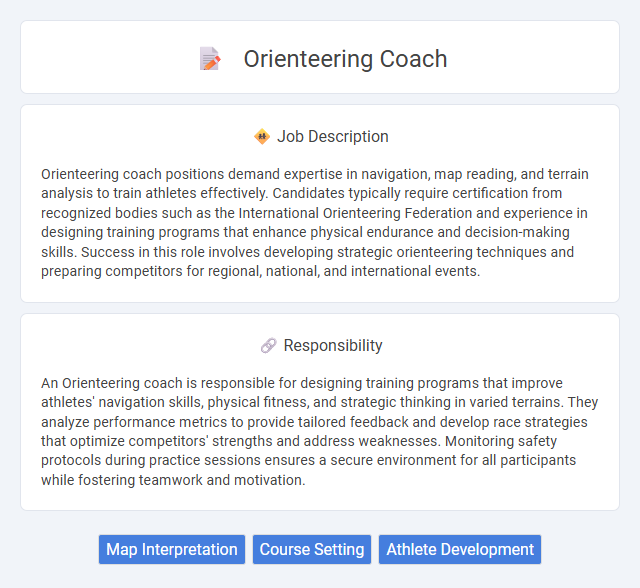
Orienteering coach positions demand expertise in navigation, map reading, and terrain analysis to train athletes effectively. Candidates typically require certification from recognized bodies such as the International Orienteering Federation and experience in designing training programs that enhance physical endurance and decision-making skills. Success in this role involves developing strategic orienteering techniques and preparing competitors for regional, national, and international events.
People with strong physical endurance and excellent navigation skills are likely well-suited for an orienteering coach position. Those who enjoy outdoor activities, problem-solving, and guiding others through varied terrain may find this role fulfilling and manageable. Individuals lacking enthusiasm for fitness or outdoor challenges might face difficulties adapting to the demands of this job.
Qualification
Orienteering coach qualifications typically include comprehensive knowledge of navigation techniques, map reading, and terrain analysis, coupled with certifications from recognized sports or coaching organizations such as the International Orienteering Federation or national coaching bodies. Practical experience in competitive orienteering, strong communication skills, and the ability to develop tailored training programs based on athlete skill levels and physical capabilities are essential. Advanced qualifications may also encompass first aid certification and expertise in fitness training to enhance athlete performance and safety during orienteering events.
Responsibility
An Orienteering coach is responsible for designing training programs that improve athletes' navigation skills, physical fitness, and strategic thinking in varied terrains. They analyze performance metrics to provide tailored feedback and develop race strategies that optimize competitors' strengths and address weaknesses. Monitoring safety protocols during practice sessions ensures a secure environment for all participants while fostering teamwork and motivation.
Benefit
An orienteering coach role likely offers fitness benefits by promoting outdoor physical activity and navigation skills development. This position probably enhances leadership and decision-making abilities through training and guiding athletes in complex terrain. Benefits may also include opportunities for personal growth and networking within the orienteering community.
Challenge
The role of an orienteering coach likely involves guiding athletes through complex navigation challenges that require quick decision-making and strategic thinking. It probably demands a deep understanding of terrain interpretation and route optimization, presenting continuous opportunities for problem-solving and adaptation. Facing these challenges may lead to significant personal and professional growth within the dynamic environment of competitive orienteering.
Career Advancement
Orienteering coach positions offer significant career advancement opportunities through certifications from recognized bodies like the IOF (International Orienteering Federation), enabling professionals to lead national teams or develop elite training programs. Gaining expertise in navigation technology and sports psychology further enhances employability and promotion prospects within competitive or educational institutions. Experienced coaches often transition into sports management roles or become influential contributors to international orienteering events and policy development.
Key Terms
Map Interpretation
Orienteering coaches specialize in developing athletes' skills in map interpretation, including reading topographic features, understanding contour lines, and recognizing terrain symbols. Mastery of these elements enables participants to navigate complex courses efficiently and make strategic route choices under pressure. Effective coaching enhances spatial awareness and decision-making speed, critical for competitive orienteering success.
Course Setting
An orienteering coach specializing in course setting designs strategic routes that challenge participants' navigation and decision-making skills across varied terrains. They utilize geographic information systems (GIS) and topographic maps to create courses that balance physical endurance and technical complexity while ensuring safety and fairness. Expertise in terrain analysis and environmental conditions enables the coach to tailor courses for different skill levels and competition standards.
Athlete Development
An Orienteering coach specializes in enhancing athletes' navigation skills, physical endurance, and strategic thinking through targeted training programs. Emphasizing terrain analysis, map reading, and decision-making under pressure, the coach fosters improved performance and competitive success in orienteering events. Customized development plans focus on building strength, agility, and cognitive agility to optimize athletes' overall race execution and adaptability.
 kuljobs.com
kuljobs.com